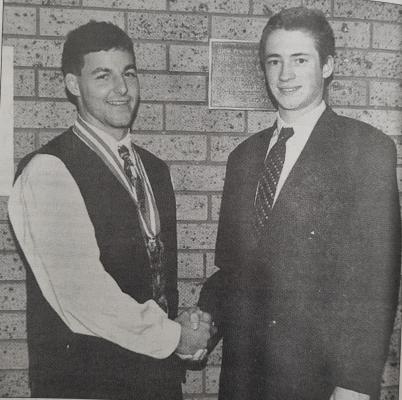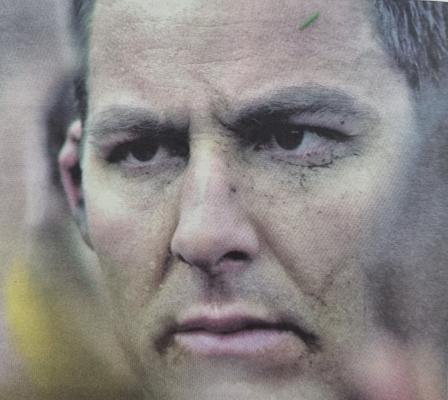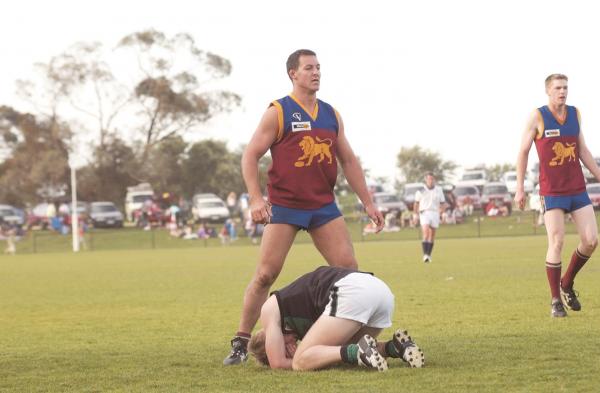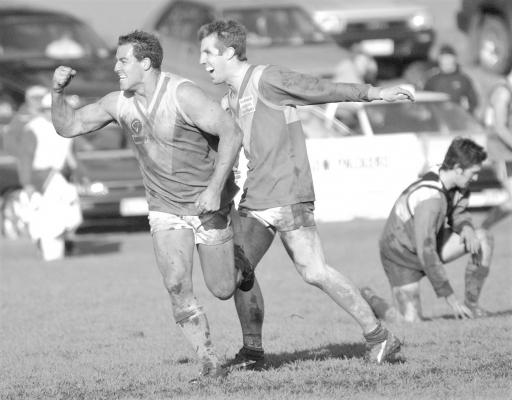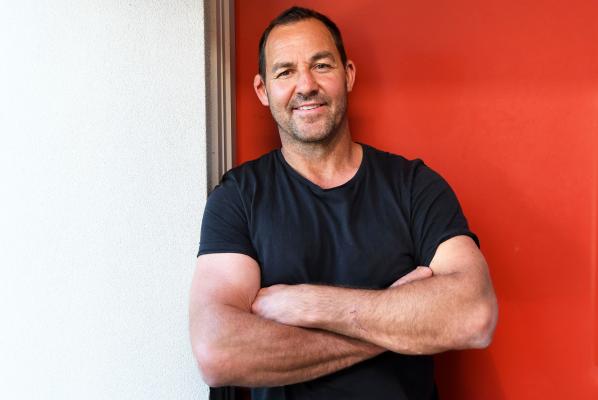
By David Nagel
It’s the greatest and most fearsome combination in football…having the mental and physical strength to impose yourself on a contest and stand tall when your team needs it most.
In the AFL think Adelaide’s Mark Ricciuto – a rare and imposing beast who could change the course of a game with a single crunching bump or inspirational goal from long range.
In this region, over the last 30 years, there’s been no better exponent of those rare and admired traits than Garfield and Pakenham champion midfielder Lincoln Withers.
The now 47-year-old is a seven-time premiership player at three clubs – Garfield, Pakenham and Waratah in Darwin – and a three-time competition best and fairest winner across three different leagues.
He has also won seven club best and fairest awards and earned All-Australian selection in an absolutely glittering football career.
But for those who watched him play, or played with or against him, it is his brute strength and intimidating force, his absolute will to win, and ability to perform in big games that will stand the test of time.
Withers was born in November 1973 and grew up in Bunyip. He attended the local primary school in town and joined the Bunyip Junior Football Club as an eight-year-old in 1982.
“Bunyip didn’t have lower age groups until they joined the Warragul and District League, so I played two years in the under-15s to begin with,” Withers recalled.
The introduction of an under-13’s team brought with it the first signs that Lincoln Withers was a super talent on the rise.
He won a league best and fairest award in that age group before transferring to Garfield to play in the under 14’s.
“It was a big jump at Bunyip at the time, from 13’s to 17’s, so I went to Garfield and never really looked back. I went to Drouin High School and we just did the normal footy stuff that every kid did back then.”
Withers was also a keen tennis player at the time and shared the court and football field with his good mate Justin Pickering. It was during these days that he would run into two Pakenham lads, Travis Murphy and Dan O’Loughlin, who represented their town from the opposite side of the net.
Murphy, O’Loughlin and Withers would go on to share premiership success at Pakenham in 2000 and 2002.
Withers also enjoyed riding motorbikes on his father Gary’s 300-acre property at Tonimbuk, and it was an accident while riding as a 12-year-old that gave an early indication of his inner determination and strength.
“I got knocked out pretty badly and broke my arm when I came off and had to go to the Royal Melbourne Hospital in an ambulance,” he said.
“My mouth was full of gravel and I had to rinse it out for days, but I got back on the bike almost straight away.”
Withers played his first senior game at Garfield in 1992 as an 18-year-old.
It was around this time that he started to feel ill at a club function and ended up in hospital where doctors found that he had a condition called ‘horse-shoe kidney’.
His two kidneys were joined and he only had one organ. He was initially told not to play football but saw a specialist who told him the area was well protected and it should give him no problem in the future.
It was the correct diagnoses, but Withers’ early football career was being held back by other factors at the time…that would eventually become his strength.
“I was very lazy to begin with, I wouldn’t go to pre-season training and would rather play a couple of reserves games and work my way into the seniors,” he said.
“But then I started to realise I wasn’t too bad at it so started to pull my head in a bit. Murray Payne was coach at the time, he was a legend of the area, and he had probably the biggest influence on my football career – he and Chris O’Sullivan.
“Murray was tough. We were playing Drouin in a final and their ruckman Matty de Boer came to our training session and was sitting in his car spying on us.
“We ran a lap and Murray said ‘when we get around that side of the ground, I want everyone to jump the fence, pick up a handful of mud and throw it at his car’.
“Even at training he was competitive.” (laughs)
Garfield was a team on the rise in the early 1990’s and made the 1992 grand final…but were touched up by Drouin.
Under Payne’s mentorship the Stars would win their sixth ever premiership with a 61-point victory over ROC in 1993 before repeating the dose in a much-closer contest the following year.
The Stars, under new coach Geoff Ravens, would lose the second semi-final to ROC by 11 points before crushing Drouin by 71 points in the prelim.
Garfield would go back-to-back for the just the second time in its history, winning by 21 points after leading by just two points at three-quarter time.
“My memory is shocking, I was just young and stupid back then, but I remember ’92 against Drouin, we shouldn’t have even made it that year, we weren’t ready,” Withers said.
“And the rivalry with ROC in those days was really good to be a part of we always knew that they were the team we had to beat back then. And we were only a small town so to try and beat teams like Beaconsfield and Pakenham was a pretty big deal for us.”
ROC would gain redemption in 1995, defeating Beaconsfield in the decider, before gaining revenge on Garfield in 1996.
It was around this time, at age 22, that Withers would have his first crack of football at a higher level.
“I was going to the gym all the time by then and trying to get as strong as I could,” he said.
“Traralgon had just come into the VFL (1996) so I went there for a bit, but it wasn’t my cuppa tea so I played six games and went back to Garfield to play with my mates.”
It was in 1997 when Withers took the West Gippsland Football League (WGFL) by storm, winning the Breheny Medal with a staggering 34 votes, 13 clear of Tooradin-Dalmore’s Rick Tyrrell and 14 clear of Drouin teammates Brett Trollope and Wes Pyle.
Withers was one of the best two players on the ground in 14 of 18 matches that year, claiming six best on grounds and eight two-vote performances to win running away by night’s end.
Coverage of the night said Withers was “physically strong, intent on destruction and always ran in a straight line at the ball.”
Despite his individual success, Garfield finished sixth in Withers’ Breheny Medal year of 1997 and would finish fourth on the ladder in 1998. Big victories over Tooradin-Dalmore (115 points), ROC (52) and Beaconsfield (47) set up a grand final clash with Pakenham.
The Lions would prevail by 20 points in the big dance and then ended Garfield’s season with an elimination final win in 1999.
Withers would then shock the local football world by transferring to Pakenham in 2000.
But it was the two years prior to 2000 that saw Withers begin a long-association with football in the Northern Territory, a journey that began in 1998 and still burns strong today.
“Robbie Young from ROC got me to go up there, he was the first I knew who was doing it,” Withers explained.
“It was hard at first, but once you get known up there and they know what you’re capable of they look after you pretty well.
“It’s awesome, you don’t have to do pre-season, just play footy and the lifestyle is great. It was just fun, especially at the age of 24 or 25 or whatever it was, you think you’re invincible.
“Robbie (Young) played at Nightcliff and the coach was Mark Motlop, who then went to Southern Districts and Robbie put me in touch with him. Southern Districts was a fair way out of town so the next year I went up with a few mates and we played with Waratah.
With Withers on board Waratah would go back-to-back in the Northern Territory Football League (NTFL) in 1998/99 and 99/2000. The first victory, an 11-goal thrashing of St Mary’s, at Marrara Oval in Darwin, was the club’s first premiership in 22 years.
After a big night of celebrations, and a couple of dares from mates, Withers thought the cup and flag needed a visit to his home state of Victoria.
“Yeah, I got in a bit of trouble for that, it ended up in the Herald Sun and everything,” he said with a chuckle.
“I put them (cup and flag) in my bag and wanted to bring them home but the club came to the airport and asked where they were. I said no I didn’t have it, but they knew I had it.
“A couple of Tiwi boys were training at Footscray so we took it out to the Western Oval for Bulldogs training…we had the flag and the cup out there. We thought it was funny but we had to send it back straight away, I think it’s pretty valuable that cup.”
Waratah President Julian Kerr certainly knew who the culprit was when interviewed by the Herald Sun.
“At 3am on Sunday the flag was wrapped around Lincoln’s head and the cup was with him too,” Kerr said.
Withers would play with and against many champions in Darwin including Darryl White, Gilbert McAdam and then Berwick coach Ronnie Burns.
His influence in Darwin was recognised when he was named on a half back flank in the Waratah Team of the Century (1917 – 2017) alongside names like Maurice Rioli (centre), Willy Rioli (rover) and McAdam on a wing.
“The footy was quick, but not as physical as down here,” Withers, a two-time best and fairest winner at Waratah, explained.
“Things didn’t get serious until after Christmas up there so sometimes you’d fly up for eight days and play two games, to help qualify for finals, and other times you’d fly up for a couple of months and stick around for a while.
“All the rules have changed now, so you can’t do what we did, but it’s still great to get up there.
“Ben and Tom Marsh were up there a couple of years back and I was up there for a 20-year reunion so I had a kick with them while I was in town.”
Before we get to his time at Pakenham and 2000 and beyond, the story of Lincoln Withers would not be complete without touching on his time in the AFL.
His first taste of the big time was a very brief encounter with Hawthorn.
“I trained for a week and they had a hit-and-run golf thing happening on the Sunday, on the other side of the city, and I didn’t go because they didn’t really explain to the new blokes what was going on,” he said
I wasn’t told that I had to be there and when I turned up to training on Monday the coach (Ken Judge) tells me I shouldn’t miss any training runs because I was carrying a bit of weight.
“I told him I didn’t know I had to be there, he came at me and said something, I cracked it with him, one thing led to another and I never went back.”
Through his connection at Garfield with Chris O’Sullivan, Withers then earned a shot at Carlton in 1999, as a 25-year-old, through then power-broker Shane O’Sullivan – Chris’s brother.
“I loved it down there but looking back I was probably too old to make it,” Withers said.
“There was talk that Carlton was going to pick me up but I didn’t realise I had to fill in any paperwork or anything like that. Everyone just assumed that I was going to nominate but I didn’t understand the process.
“I had a coach in Darwin who made contact with Carlton and asked them why they hadn’t picked me up. They said I hadn’t nominated and that was the first I really knew of it.
“Looking back now you think what could have been if I hadn’t had been so stubborn.
“But it was awesome, I drove down to Carlton with Dan O’Loughlin and it was great fun being around those champions.
“Fev (Brendan Fevola) had just started, Aaron Hammil was there too, but Carlton had players like Fraser Brown, Brett Ratten and Craig Bradley in the midfield and we were never going to get in before them.”
The year 2000 saw Withers play alongside some of the great midfielders of the competition, players like O’Loughlin and Pakenham skipper Michael ‘Jock’ Holland.
“They were great players, really good, we knew what each other was doing, well most of the time anyway,” Withers said with a laugh.
“Jock and I used to run into each other quite a lot when we played against each other and even when we played together we did the same.
“I liked playing against him because he was a little bit slower than me but he was a great ball winner.
“We even clashed heads a lot as teammates.
“One day at Pakenham he went to get it, I went to get it and we both had our hands on the footy. He cracked at me a bit for that and said, ‘What are you doing’, but we both just loved getting our hands on the footy.
“And Dan, he used it really well, used his body really well, he was a great player too.”
The ball-winning ability of Holland, and the strength of players like Withers and Joel Padley would see Pakenham dominate Beaconsfield in a water-logged 2000 grand final at Cora Lynn.
Withers would return to Garfield in 2001, making the WGFL Team of the Year as the Stars made the grand final from fifth, only to be crushed by Beaconsfield in the decider.
It was then back to Pakenham for what would turn out to be the best season of his career.
“It probably seems strange that I switched between Garfield and Pakenham so often during that time but I had great mates at both clubs and there were reasons every time for moving,” he said.
“At the end of 2001 I probably would have stayed at Garfield but the club moved to West Gippsland Latrobe and I didn’t want to travel that far to play football…I wouldn’t have enjoyed it.
“Pakenham moved into the MPNFL in 2002 so that was a good challenge. Narre Warren was good, Doveton was strong, it was a pretty even competition.”
It takes something pretty special, in such an outstanding career, to stand out from the pack, but Withers’ 2002 season was something out of the box.
He won the 2002 Norm Walker Medal, his second league award, and would turn the 2002 grand final into the Lincoln Withers spectacular!
Pakenham lost to Narre Warren in the second semi-final, before surviving a thrilling preliminary final against Doveton, with Glen ‘Sunny’ Wouters taking an absolute speckie in the dying stages to get the Lions across the line.
It was then 2002 grand final day against Narre Warren at Langwarrin.
Pakenham coach Joe Lenders had some sleepless nights leading into the big dance but decided late in the week to go hell for leather and stuck his four big guns in the middle of the ground.
Holland, Murphy and O’Loughlin would start in the midfield, with Withers, an inch shy of six foot, taking on Magpie giant Garth Pickford in the ruck.
“Joey told me that it would be happening, but I actually suggested it to him that I should play in the ruck,” Withers explained.
“He (Pickford) was a big dinosaur, really tall and quite skinny, and my plan was to just barrel into him from the first bounce.
“He didn’t like it one bit and I remember ‘Birdman’ (Brett Evans) coming into the ruck to try and change things around a bit.
“He (Pickford) was related to Joey in some way at the time and didn’t talk to him for a few months after that.”
Pakenham was well placed at half time, leading by 14 points, but was what was about to transpire still gets talked about almost 20 years on to the day.
The start of the third quarter became the Lincoln Withers Show.
Firing on all cylinders, he would take a strong grab in the goal square at the two-minute mark of the third term, and back up that conversion with a dribble kick from 25-metres out just two minutes later.
And when he pumped his fists after taking a mark and playing on from 25 metres out, at the 11-minute mark of the third term, the premiership was heading back to Toomuc Reserve.
“Withers played arguably the best individual term of football seen in the division for the year, booting three goals from the ruck and prowling the ground with the intimidation of a winner,” said the match report of the day.
Holland was Mr Consistent, winning the VCFL Medal, but it’s the heroics of Withers that last in the memory of those who attended that day.
People who know him well know that once he gets in that zone…there’s no way of stopping him.
So how does it feel to be the focus of attention and be able to deliver when it counts most?
“I don’t know, I can’t describe it really, I just wanted to always play my best and help my team win every time I played footy,” a humble Withers said, before explaining his attitude to the game.
“It’s just your mindset really, being aggressive at the ball and making yourself fit enough to back up that mindset.
“Because of the gym work, and playing footy 12 months of the year, I was probably fitter and stronger than most blokes back in the day and I just loved running into them and knocking them out of the way.
“I could kick both feet 50 metres and people would ask which foot do I kick with because they can’t tell the difference. I use to say ‘What foot you kick with depends on which way you’re going’. (laughs)
“Being fit just makes you feel a lot stronger and more positive about yourself.
“I’m an aggressive footballer, not in a dirty way, but love the physicality of football so you have to be prepared if you want to play that way.
“Up in Darwin they would get out of the way but stronger players bounce back…the more physical the better I reckon.”
Withers would then return to Garfield in 2003, losing the grand final to Warragul by 19 points that year. He made a pledge to then coach Ben Soumilas that things would be different in 12-months’ time.
“We were at a party after the game in 2003 and I remembering promising Souma we would win it the next year, and we did,” he said.
“That was always going to be our flag in 2004 because of what happened the year before.”
Soumilas was nervous the night before the game and spoke with Withers, his captain and assistant-coach, who assured him everything would be okay.
With Ben’s brother Andy Soumilas winning the Breheny Medal that year and Withers running second, the Stars had the quality to shine on the big day.
On an absolute mudheap Withers would come out with his blinkers on, kicking the opening two goals of the match to set the Stars on the path to victory. Withers would kick three goals and have 27 possessions to claim the VCFL Medal that year.
“On days like that, when everything goes your way, you just think you’re unstoppable at times, but then you do get stopped and it wakes you up pretty quickly and you realise you’re not really that good,” he said with a chuckle.
“I remember the first goal. Matty Cunningham took a mark and was too far out and I remember saying, ‘give it to me, give it to me’.
“He handballed it to me and I kicked it through and then got another one from a similar distance a few minutes later.”
Withers was the only player to kick multiple goals that day with the score reading Garfield 7.5 (47) to Warragul 2.4 (16) when the final siren sounded.
Withers is a humble man, and very hard to get a word out of…but he did show a touch of arrogance that day!
“Yeah, I had hats made up before the game and had them in my bag and handed them out, on the ground, after the game,” he said.
Withers would go back to Pakenham one more time and would continue his football in Darwin. In early 2008 he was playing football in the NT with some players from Kyabram, who enticed him to play for the Goulburn Valley League (GVL) club that year.
After missing the first two games at Kyabram he would claim his third league best and fairest award – the Morris Medal – in one of the strongest competitions in the state.
Even at age 34 – Lincoln Withers was still an absolute jet!
He coached Waratah in Darwin for two seasons in 2009/’10 and 2010/’11 and had short winter stays at other clubs around the countryside.
A laconic figure off the field, Withers was a football dynamo that has played either side of 500 games across an illustrious career.
“Yeah it’s a lot of football but playing in Melbourne and Darwin you were always looking forward to the next thing, catching up with mates you hadn’t seen for six months, and that kept me fresh,” he said.
“Playing for that long it’s good for mateship and all that, but sometimes it’s probably not a good thing for you, because you’re catching up with mates all the time and drinking beers (laughs).
“But it’s been enjoyable. I probably regret not playing AFL because I know I had the ability but winning seven premierships is something I’m proud of.
“A lot of players go their whole careers without winning one, and my seven are across three clubs so you’re always bumping into someone to share those experiences with.”
Withers currently lives in Mornington with his partner Erin and three-year-old son River.
He has two children in Darwin, Zac, 13, and Olivia, 11, and can’t wait to hop on a plane and see his kids in the coming months, as he has done three or four times every year before Covid.
And who knows, he might even have a kick in the Mornington Reserves after senior coach and fellow legend Simon Goosey enticed him to get involved with the club in some capacity in 2022.
Thanks for the memories Lincoln Withers…you’re a superstar player that will never be forgotten around the region.


